#cintamani
Explore tagged Tumblr posts
Text




Rare pattern for this antique purple kimono, depicting dragons in the clouds among what looks like strings of pearls.
Hold by dragon's claws, those jewels are probably hôju (Cintamani/wish-fulfilling pearl). They also remind me of other pearls associated with dragons in Asia, like Ryûjin's mythical tide jewels.
202 notes
·
View notes
Text


Nicholas Roerich in his study at Kulu "Rex Fiat" is the centerpiece figure of the triptych behind him Stone meteorite "Gift of Orion" above
3 notes
·
View notes
Photo

Nyoirin Kannon (Cintāmaṇicakra), 14th century
Kamakura period, Japan
Hanging scroll; ink and colors on silk H 87.5, W 46.2
Collection of the Nara National Museum
#cintamani#nyoirin#kannon#cintamanicakra#Avalokitesvara#Buddhism#figure#iconography#14th century#kamakura period#Japanese#Nara National Museum#painting#art#art history
9 notes
·
View notes
Text
youtube
All I Know of Love, a film by Emma Ruth Rundle and Geert Braekers
#music#emma ruth rundle#geert braekers#video#cedric demolis#adrien vanhaelter#marco mazzola#wolf carr#cintamani calise#ethan indorf#elisha brodsky#brandon daniel#josh winsor#matthew rich#blake armstrong#darcy sharpe#alex vicari#Youtube
31 notes
·
View notes
Text
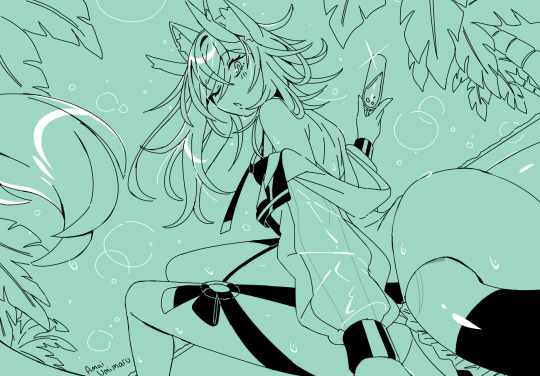

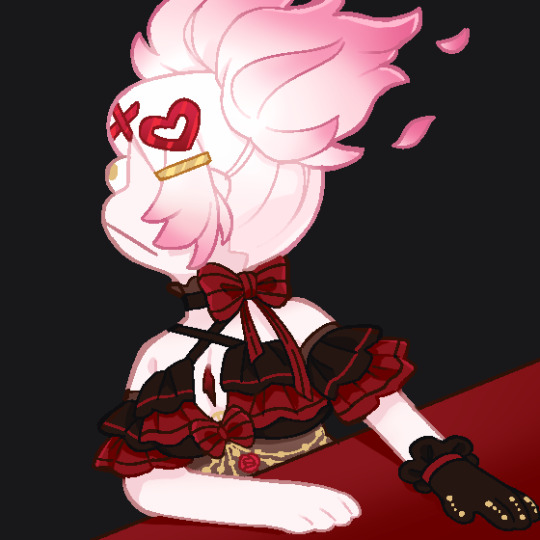
A batch of commissions that I finished recently!
For/Of the following VTubers
🐲Kip Cintamani
Twitter
Twitch
🎃Rurika (fan mascot)
Twitter
Twitch
👻Amonti Ado
Twitter
Twitch
2 notes
·
View notes
Text

Ophelia Lovibond,Jay Heyman and Michael Landes in Hooten & the Lady (2016) Cambodia
Ep7
Alex and Hooten attempt to track down the priceless Cintamani jewel in Cambodia, which can manifest whatever one wishes for, but they soon attract the attentions of a ruthless Vietnamese drug gang...
*When Hooten and Alex enter the cave they find a crevasse that has many varies snakes in it. While Cambodia has many types of snakes several of the snakes in the crevasse are common only to the Americas. Also the sound emitting from the crevasse is the distinctive sound of a rattlesnake which is also only found in the Americas.
#Hooten & the Lady#2016#tv series#Ophelia Lovibond#Jay Heyman#Michael Landes#Cambodia#Ep7#Cintamani jewel#old friend#old enemy#secrets#action#adventure#drama#just watched#balloon
0 notes
Text
Writing Notes: Mystical Items & Objects

Examples in Mythology and Literature
Pandora's Box
The god Prometheus stole fire from heaven to give to the human race, which originally consisted only of men
To punish humanity, the other gods created the first woman, the beautiful Pandora
As a gift, Zeus gave her a box, which she was told never to open
However, as soon as he was out of sight she took off the lid, and out swarmed all the troubles of the world, never to be recaptured
Only Hope was left in the box, stuck under the lid
Anything that looks ordinary but may produce unpredictable harmful results can thus be called a Pandora's box
Hermes' Winged Sandals
Also called the Talaria of Mercury
Are winged sandals, a symbol of the Greek messenger god Hermes (Mercury)
They were said to be made by the god Hephaestus of imperishable gold and they flew the god as swift as any bird
Cintamani Stone
Also referred to as the Chintamani
A wish-fulfilling stone that features across both Hindu and Buddhist religions
The stone features as one of many Mani Jewel (i.e., several gems that are mentioned prominently in Buddhist literature) images that can be found in the scripture of Buddhism
In Hinduism, the stone is connected to the gods Ganesha and Vishnu
Usually, it is depicted as a jewel in Vishnu’s possession known as the Kaustubha
The Kaustubha acts as a sign of divine authority
Arcane Artifacts & Objects
Offer a gateway between time past and time present, bringing layers of ancient history and new-world intrigue to a narrative
Such items are typically represented in fiction as works of long-lost knowledge, primordial features or landmarks, and curious objects of mysterious origin
Often lying dormant until the pivotal moment of discovery, these items invite characters and readers alike into a dance with the unknown
Examples: Necronomicon, Genie's Bottle
Necronomicon
Also referred to as the Book of the Dead
It appears in stories by H.P. Lovecraft
A dark grimoire (i.e., a magician's manual for invoking demons and the spirits of the dead) of forbidden knowledge
Used to open gateways of unearthly powers and cosmic horrors
Genie's Bottle
The classic magical item from mythology, also featured in Aladdin
A vessel of wish fulfillment that often leads to dramatic and unexpected consequences
Doorways & Portals
Doorways in fiction serve as gateways between worlds, dimensions, or states of reality, providing characters with universe-hopping capabilities and genre-defying journeys
These portals, whether physical structures or fantastical mechanisms, open up limitless storytelling possibilities, allowing for sudden shifts in setting and introducing elements of surprise and surrealism
Examples:
C.S. Lewis' wardrobe in The Chronicles of Narnia serves as a secret portal to a fantasy world, bridging the mundane with the fantastical
The eponymous board game in Jumanji transports its players into a wild and perilous jungle adventure, wrenching them from the safety of their living room
Jewelry, Gems, and Garments
Along with other various accessories, these serve several narrative functions, from symbolizing power and status to bestowing unique abilities upon their wearers
These items can act as plot catalysts (i.e. MacGuffins), embody character traits, or hold deep cultural or magical significance within a story’s world
Example: The Amulet of Mara in Skyrim not only reduces the cost of Restoration spells but also unlocks marriage options for the player, integrating gameplay with the narrative
Legendary Objects of Power
Carry with them stories of grandeur and lore, passed down through generations and intertwined with the fates of those who wield them
These are the objects that make or break worlds, bestow immense strength, and are frequently considered among the most powerful items in fiction
Example: Though it's never actually been seen, the Kusanagi Sword from Japanese folklore is a fabled sword that represents valor, said to be endowed with divine powers
Machinery and Technologies
Stretch the boundaries of physics and logic to offer a glimpse into what could be possible in alternate or future universes
These innovations, whether grounded in current science or verging on the fantastical, propel narratives forward and deepen the complexity of the story’s world
Writers can leverage these technological wonders to enhance their storytelling, using them to explore themes of power, ethics, and the human relationship with technology
Example: The body shields in Dune generate a protective forcefield around the wearer—advanced technology that current militaries can only dream of
Mundane Everyday Items
Possess extraordinary storytelling potential to transform the unassuming into the unforgettable
Seemingly ordinary, these objects can surprise both characters and readers, unveiling hidden depths and abilities when least expected
These seemingly mundane objects could fall into unsuspecting hands and create chaos or catalyze a hero’s journey
Additionally, they might only reveal their true nature to those worthy or capable of wielding their power, which can set the stage for narratives that are centered around discovery and mastery
Example: Oscar Wilde’s Portrait of Dorian Grey presents art as a vessel for dark magic, encapsulating the protagonist’s sins while he remains untouched by time
Sources: 1 2 3 4 ⚜ Writing Notes & References
#writing notes#fantasy#mythology#literature#greek mythology#writeblr#spilled ink#dark academia#writing reference#poets on tumblr#poetry#writers on tumblr#writing prompt#fiction#light academia#studyblr#booklr#creative writing#writing resources
152 notes
·
View notes
Text
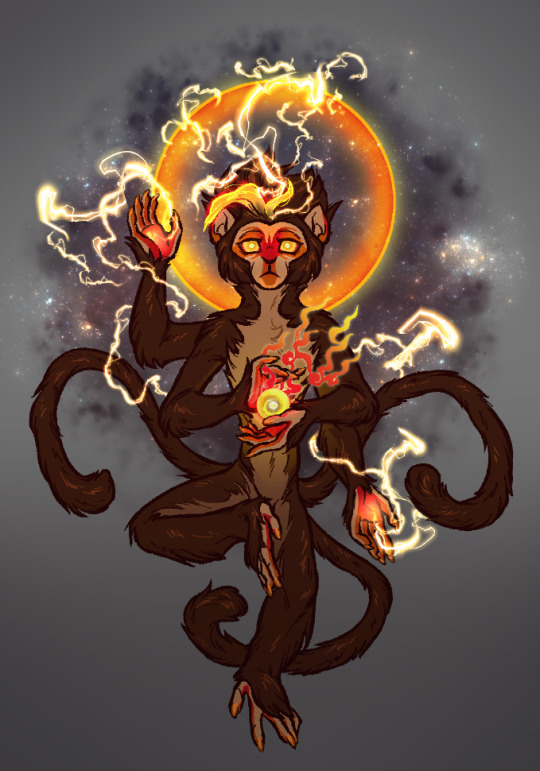
The fifth is the Wish-fulfilling Jewel Monkey, who knows the path of heavenly bodies, discerns goodness from illusions, casts away Calamities, and satisfies all desires of thought.
harbinger of chaos is out, a Cintamani dropped on the eastern ocean to become a fifth mystical monkey is in.
674 notes
·
View notes
Text
How many rare items does Cale have?
As we know, Cale likes to loot his enemies. It also has an ancient power that is literally a detector of divine artifacts.
I love how often in the book characters talk about some item/power and it turns out Cale has had it for over 100 chapters, even if it's useless to him. Syrem talks about the crown and knows where it is, meanwhile Cale pulls it out and asks is this it. Next up is Cale talking to the enemy again. It turns out that he has been trying to find the divine artifact of the Sun God for 500 years. Cale found this under the trash bin... The next situation was with the white star. He said he didn't want to get the water wall because he prefers offensive abilities. However, Cale took the Water of Judgement for himself. At that moment, even sky eating water reacted by saying "Wait. Water of Judgement is me." Another situation with the white star was related to blood drenched rock. Where he literally showed that he took that power.
In the second part, Cale got the sword, ring and crown. His enemy literally traveled to another world to get the ring. The same ring Cale gave Eruhaben. And supposedly stealing never brings anything good, ahh.
Cale items:
Absorpting necklace - Lock got it for him, from the same mountain where Eruhaben lived. Used to store dominating water.
Top whip - an item with half the power of a thief. Allows you to hear wind elementals. To gain this power he had to undergo a trial where his family and friends died and Cale was the only survivor. It's too cruel Thief 😰
Compact mirror - Divine artifact of the Sun God. The Princess of the Empire hid it where no one would ever find it. Cale used Sound of the Wind to find the item. It was given to Saint Jack. Saint used it and allowed the artifact's true form to manifest. The sword was given to Hannah.
Book - divine artifact of the God of Death. Given to Cage who then returned the item. Used to trap the Sealed God.
Watering can - Item found in Sekk's household. Divine artifact God of war. Never used.
Jar - The jar that Eruhaben used to extend his life. Cale is the only person who knows the item's origin.
Fake World Tree - Cale took this tree from Molden Kingdom. He planted it in Xiaolen.
Root dagger - A dagger given by World Tree. He used it to stab himself and then White Star. He got a shard of immortality after using it. In addition, his regenerative ability became stronger.
Root - World tree told Pendrick to pass this to Cale. Not used (unless I remember wrong).
Heirloom - item given by a duke Fredo. It has a record of what Fredo looked like when he was a child. It allows to transform into a child. Fredo never asked for the item back so Cale still owns it.
Cintamani - An item left behind by a monster. It allowed communication between Cale and KRS from Earth2. Used during the temple test and the item was destroyed.
Fruit from World tree - item that was supposed to be given to Raon later. I don't remember it being mentioned later, though. So Cale probably still has it.
Seed - Item taken from magic tower. I don't remember it being mentioned what it was used for.
Mirror - an item given by the God of Death. It allows to travel between worlds. Talking to worlds, communicating between worlds. Allows you to talk to the Gods. In the list of favorite and only Gods in contacts is only the God of Death.
Cape - item from Xiaolen. It belonged to the first Emperor who became a God. Cale used this once.
White Crown - item stolen from Sekka household. Allows you to control the guards of the Dragon Slayer Village. It has reserves of energy that can be used. Merged with another crown.
Diary - has the power of Drew. Even if it's only half power.
Badge - inside is blood drenched rock.
White mask - White Star mask, has all his powers within it.
Whip - a gift from Xiaolen, given to Eruhaben. Eruhaben improved it and temporarily gave it to Cale. He used a whip to destroy the door in the central plain.
Rock necklace - Divine artifact given by God of Protection. It is not known what effect it has.
Furnace - I'm not sure what this item was called. Divine artifact. A gift given by God of Fire of Purification. Powered by the fire of destruction, it helps to purify Jiangshi.
Core of the barrier - If I remember correctly, the energy inside belonged to the World tree. Cale ate it to restore his energy.
central plain statue - great item for creating formations, very difficult to destroy. It has a world tree seed from Aipotu in it.
Sword of the guardian - The sword form Aipotu. Cale gave it to Clopeh and he is officially his guardian.
Red Crown - Crown from Aipotu. Heirloom belonging to the dragon slayers who were the emperors in Har Empire, now kingdom. Merged with the white crown.
Ring of the Dragon Lord - the ring officially belongs to Raon. However, Eruhaben has it temporarily, probably when Raon is older he will give him the ring.
It's a really long list and I've probably forgotten something.
#Divine artifact#tcf#tcf part 2#trash of the count's family#lout of the count’s family#ancient powers
81 notes
·
View notes
Text

“Whatever precious jewel there is in the heavenly worlds, there is nothing comparable to one who is Awakened.” ~The Buddha. Kokuzo Bosatsu Talon Abraxas Kokuzo-bosatsu (Akasagarbha Bodhisattva), seated on lotus throne in front of full moon.
The Bodhisattva Akashagarba is holding the Cintamani Jewel in the left hand and seated on a lotus.
The Cintamani stone started as a Hindu concept; it has connections with the Gods Vishnu and Ganesha. It also has connections with the Serpent Lord (the Naga King, who also slithered his way into Buddhist cosmology) as well as the Chimera-like Makara beast.
The Stone enters Tibetan lore by falling from the heavens in a chest with three other treasured objects, bringing the Dharma to Tibet in the process. This has led some to speculate that it might have been a piece of meteoric rock, but I prefer the Tibetan version better – it’s Cintamani, the sacred wish-fulfilling jewel.
29 notes
·
View notes
Text
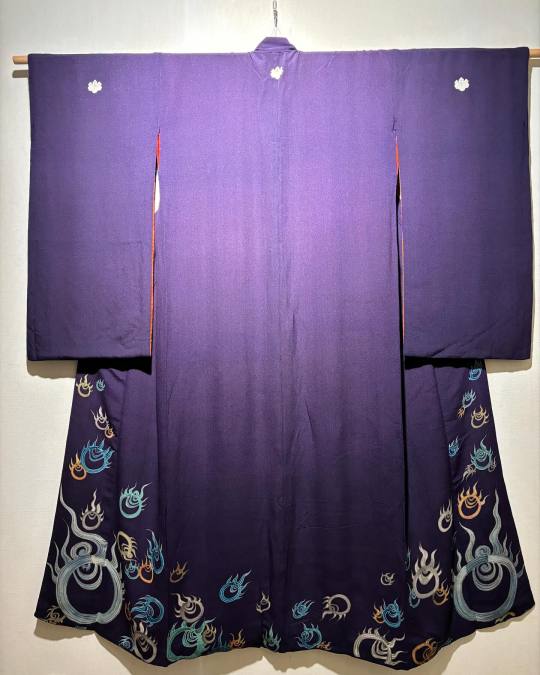
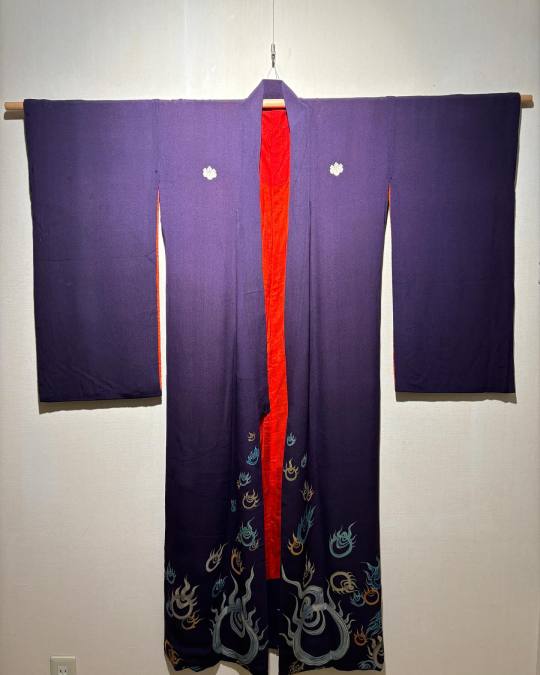
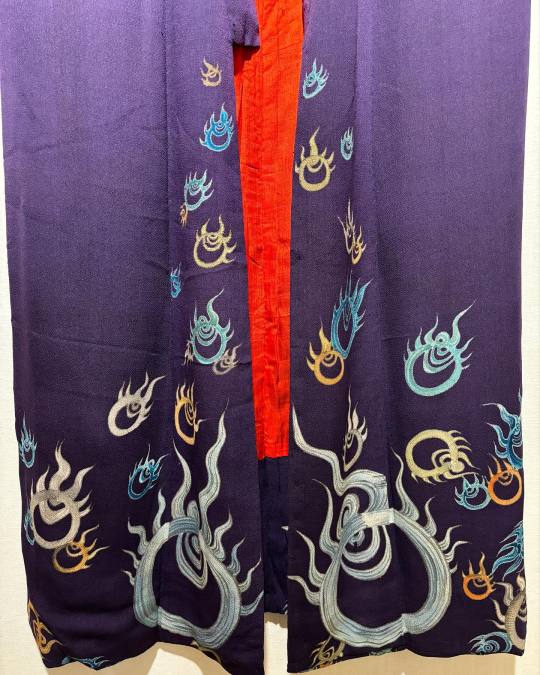
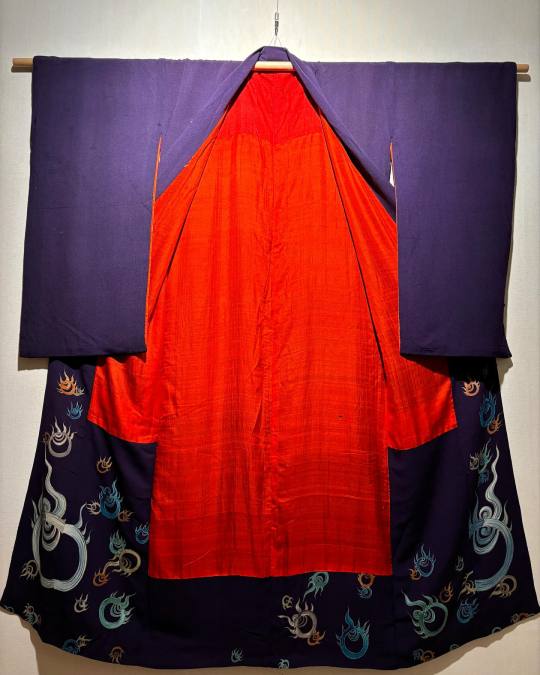
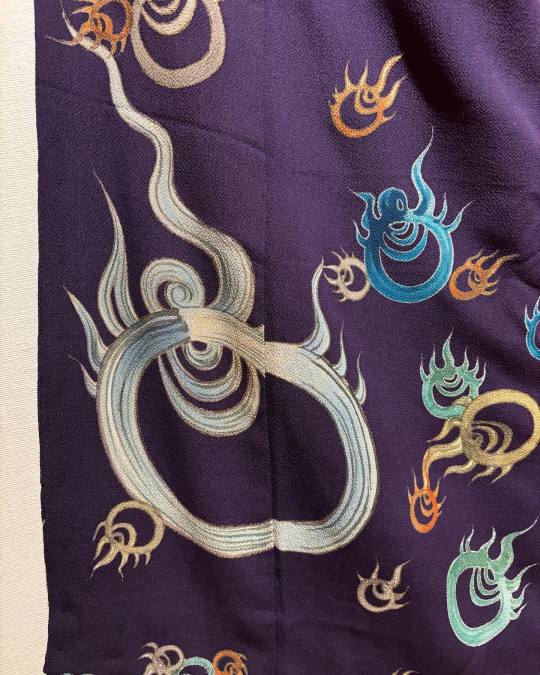
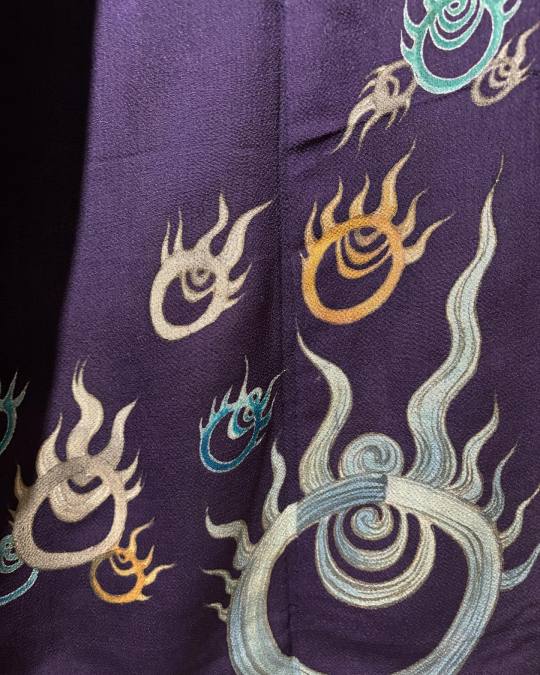
Striking antique purple kimono with blazing hôju (wish-fulfilling jewel looking like flaming pearl, an ancient pattern representing the cintamani stone).
The mirror skirt pattern placement is a good example of ryôzuma 両褄 , which was all the rage for late Meiji-early 20th century formal kimono like this irotomesode.
#japan#fashion#kimono#houju#hoju#wish jewel#flaming pearl#cintamani stone#mirror skirt pattern#ryozuma#ryouzuma
426 notes
·
View notes
Text
Cintamani Sap
Gin, orange liqueur, lemon juice, honey syrup, ghee butter, and blue food coloring
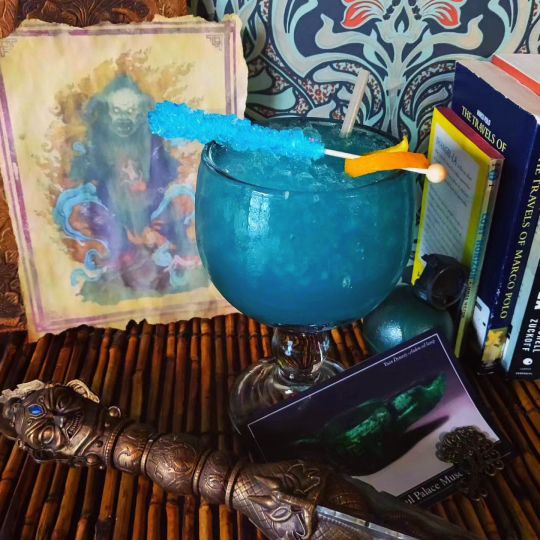
Nathan Drake raced a madman and his entire army to the steps of Shambhala.
I couldn't believe it when I first heard the story. And who could blame me? Especially because Victor Sullivan was the first person I heard it from. But Chloe Frazer did corroborate it and eventually Nathan Drake himself showed up at my bar with a small jar full of blue resin to prove it. He said what he had was all that was left of the mythical Cintamani Stone. Don't tell Nate, but I may have "accidentally" spilled them across the bar and pocketed one of the small blue pebbles in the chaos. Lucky I did too. I had no idea at the time, but that little bit of resin eventually saved my life.
According to legend, the Cintamani Stone was a jewel that would give its wielder great power and grant their every wish, but in reality it wasn't a stone at all. It was actually a massive piece of amber from the Tree of Life, hidden at the center of the lost city of Shambhala. The tree possessed incredible medicinal properties, like aloe vera, arnica, calendula, willow bark, yarrow, and other healing plants but on a much greater scale. When you consume the sap from the Tree of Life, your natural healing rapidly accelerates and you gain boundless energy. It can even halt aging. But over time, too much of the sap changes you. It stains your skin blue and your teeth black, and it gets inside your mind. You become dependent on it, a Guardian dedicated to protecting Shambhala and the source of the sap at all costs.
The Cintamani Sap cocktail is my attempt to capture the energizing and refreshing nature of the Tree of Life. Gin was chosen as the base because the prominent juniper flavor provides a piney, resinous taste. Ghee butter adds texture and flavor and harkens to butter tea, a popular drink in the Himalayas and surrounding regions. The honey syrup, in addition to sweetening the cocktail, thickens it slightly for a more sap-like consistency and a drop of blue food coloring gives the perfect color to match the Cintamani Stone.
CINTAMANI SAP
Ingredients: 2 oz. gin 1 oz. dry curaçao (orange liqueur) 0.75 oz. lemon juice 0.75 oz. honey syrup 0.25 oz. ghee butter 1 drop blue food coloring Melt the ghee butter on a spoon over a flame or in a microwave. Pour all the ingredients into a cocktail shaker with pebble ice or crushed ice. Shake and strain through a fine mesh strainer onto fresh ice in a Mai Tai or double Old Fashioned glass. Garnish with a blue rock candy stick and an orange slice or peel.
I originally made the Cintamani Sap with a London Dry gin, specifically Bombay Sapphire, but it works wonderfully with a more citrus forward gin like Plymouth as well. Some of the ghee butter solidifies as you shake the drink so straining with a fine mesh strainer is important. The butter adds to the taste and texture of the drink, but there shouldn't be big butter flakes in it.
For the orange liqueur, I strongly recommend Pierre Ferrand's Dry Curaçao. As a replacement, Grand Marnier or other decent brandy based orange liqueurs would be fine. You could use blue curaçao which would also eliminate the need for the food coloring, but most commercially available blue curaçaos (and cheap orange liqueurs in general) are sickly sweet. If you use one, I would probably adjust the amount of honey syrup down to balance out the extra sweetness you'd get.
The recipe for honey syrup can be found here.
#uncharted#uncharted 2#nathan drake#gin#cocktail#uncharted cocktail#zoran lazarevic#shambhala#chloe frazer#victor sullivan#uncharted oc
40 notes
·
View notes
Photo

The Bodhisattva Nyoirin Kannon, 14th century
Ryōzen
Nanbokuchō period, Japan
Ink and light color on silk
The deity Nyoirin Kannon sits atop a boulder on a verdant mountainside, his eyes downcast in silent contemplation. Nyoirin Kannon is said to fulfill people’s every wish and is depicted here pondering how to save humanity. The spot his left hand touches gleams golden. In the sutras, which explain the teachings of Buddhist deities, it is written that Nyoirin Kannon touches the “shining mountain,” Mount Potalaka. This painting alludes to that detail by depicting him touching a gleaming golden rock. The artist is Ryōzen, who was active in the vicinity of Tōfuku-ji Zen Temple in Kyoto during the 14th century. The painting bears Ryōzen’s signature in its bottom-right corner. No details about Ryōzen are known, but it is rare for the name of the artist of a 14th-century work to survive, making this a valuable example. This is an ink wash painting. The artist portrays a space with depth through the use of different shades of ink. The use of gold causes Nyoirin Kannon to stand out against the black ink used for the majority of the painting. Details such as the deity’s diadem, accessories, the pattern on his robe, and the veins on the leaves of the lotus throne on which he sits are delicately portrayed using gold paint made from a gold-powder base. Similar uses of gold paint are often seen in traditional paintings of Buddhist deities. In this painting, the gold-painted sections appear especially vivid amid the varied shades of black ink.
Collection of the Tokyo National Museum
#nyoirin#kannon#Avalokitesvara#nanbokucho period#Japanese#painting#Ryozen#art#art history#14th century#tokyo national museum#gilding#gold#buddhism#bodhisattva#iconography#cintamani#cintamanicakra
1 note
·
View note
Text
Religious symbolisms on EP 12 in Christian and Buddhism/Hinduism perspectives
Isn’t it amusing that the final episode, EP12, fell on this year’s Lenten week? Rebirth and resurrection, the anastasis… those themes. Easter Sunday, the Christian Jesus alive again overcoming Death itself.
Isami Ao being reborn as Bravern’s latest persona, Burn Brave Big Bang, to defeat the all-powerful of all the Death Drives. Most of all, Lewis Smith coming back. His own resurrection, his own rebirth.



Burn Brave Big Bang is definitely Isami complete with his standard snarl


Verum Vita. What’s in a name? First off, it is a bastardised Latin that lacks an “e” at the end that means “the truth of life,” which sounds ironic as her lust for murder supersedes.
Upon introducing Verum Vita, a choir-like music could be heard chanting in Latin. (It was reminiscent of Carmina Burana’s “O, Fortuna” or “Dies Irae” by Guiseppe Verdi.) Then a pink lotus 🪷 appeared on her feet/bottom of her tower. A lotus has a significant meaning in different religions. In Christianity, flowers don’t often play an integral part in worship. Though, it represents purity and God’s creation of the universe. However, in Buddhism, Hinduism, Jainism and Sikhism, the lotus signifies purity of the heart, soul, and mind, and also, rebirth. It is an extraordinary exemplary as such that it remains pure and clean when coming out from the murky waters.
Usually, Hindu and Buddhism religious arts consist of deities either seated or floating on a lotus flower.
Verum Vita resembled the deity Kisshōten, the equivalent of Lakshmi in Japanese Buddhism. With a blossoming lotus under her feet, this goddess symbolises fertility, wealth, prosperity and beauty. The lotus under Verum Vita was not just any colour, but pink. In Buddhism, “the pink lotus flower is the supreme lotus and is considered to be the true lotus of Buddha.”


A few frames later, the lotus pedestal where she used to stand on transformed into marsh grass, which could be interpreted as the moment her fallen mask, her real intention, was revealed. Instead of holding a wish-fulfilling jewel called Cintamani, Verum Vita was holding a sword.
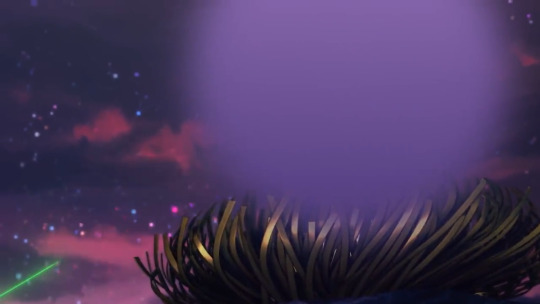
It is interesting the way this series subvert everything and use the religious imagery as the forces of evil subjugating the humankind.


Both Isami and Verum Vita both declared that they didn’t want to die. But there lies the difference between the two. When the first one wanted to save the world, the other strived to destroy it.
It feels like a mishmash of all beliefs fused into one huge spectacle to make this episode parts parody, parts fairy tale, and it is interesting to watch.
#bang brave bang bravern#yuuki bakuhatsu bang bravern#ao isami#verum vita#episode 12#wall of text#religious imagery#lulu
69 notes
·
View notes
Text
Imagine the chaos if the people in the indignity test suddenly came into the LCF world-
Dodam calling Cale 'the terrible bastard' while everyone is confused
Raon is happy knowing that even in another world, his human will always save him, just like he promised
Maybe even them fighting for Cale's attention
Both CHs look at each other warily but bond over the confusion that is known as Cale Henituse. Also, CH promises to teach indignity test CH how to become stronger to protect his new-found family. Cale is scared at this, as always
Alver laughing with a refreshed smile, while the younger him wonders if he's gone crazy when he sees how much paperwork he has.
Tiny Alver being happy when he sees that the dark elves, and them too, have been accepted by people. It only reaffirms the fact that he didn't make the wrong choice.
Baby KRS who is wary at first and sticks to CH like glue, however soon opens up with the help of the children. I can imagine Alver going 'Aigoo, why can't I have such a cute dongsaeng?'
However it's ruined when they teach baby KRS how to scam with a bright smile to get money (a critical hit to Alver)
(If you want angst then they wonder why KRS is here when he's so young, however they see how skinny he is still, his footsteps too quiet to not have been learned, the way his eyes were always looking for escapes and he hated people getting too close. The way he dissociates sometimes, just staring blankly at the wall. It's... unnerving, to say the least, to watch a child go so blank and unmoving.
It's clear that something terrible had happened, but both CH, KRS and Cale (to Alver) hold their silence, so all they can do is treat him with care.)
Tiny KRS and the children bonding.
Raon being taught by Eruhaben and Rosalyn.
If they still had the cintamani, maybe they could also dote on baby KRS and how cute he was as a kid, asking 20yr KRS why couldn't he smile at them like that and how such a cute kid turned into such a grump- (tsundere-
Them helping each other out for the future, and sharing concepts/ideas from their worlds.
Vicross having to babysit but he doesn't mind
Ron noticing the similarities between KRS and Cale and deciding to pay more attention to the two of them
Anyways, wow. This got way longer than I expected-
#I don't have the motivation or skills to write this#So I'll just ramble about it instead#kim rok soo#trash of the count's family#lout of the count’s family#alver crossman#alberu crossman#Tcf#lcf#cale henituse#choi han#raon miru#I'm super curious about CH's indignity test#The author really trolled us by giving snippets but not all of it#I wanted to see his reactions and how he solved everything (plus him most likely beating up KRS's uncle)#We were robbed of tiny KRS too :(#I hope it comes up again at least in side stories if there's going to be any#If it doesn't then I'll just write it myself-#beacrox molan
337 notes
·
View notes
Text

Kokuzo-bosatsu (Akasagarbha Bodhisattva), seated on lotus throne in front of full moon.
The Bodhisattva Akashagarba is holding the Cintamani Jewel in the left hand and seated on a lotus.
The Cintamani stone started as a Hindu concept; it has connections with the Gods Vishnu and Ganesha. It also has connections with the Serpent Lord (the Naga King, who also slithered his way into Buddhist cosmology) as well as the Chimera-like Makara beast.
The Stone enters Tibetan lore by falling from the heavens in a chest with three other treasured objects, bringing the Dharma to Tibet in the process. This has led some to speculate that it might have been a piece of meteoric rock, but I prefer the Tibetan version better – it’s Cintamani, the sacred wish-fulfilling jewel.
Image: Kokuzo-bosatsu Mahaboka
11 notes
·
View notes